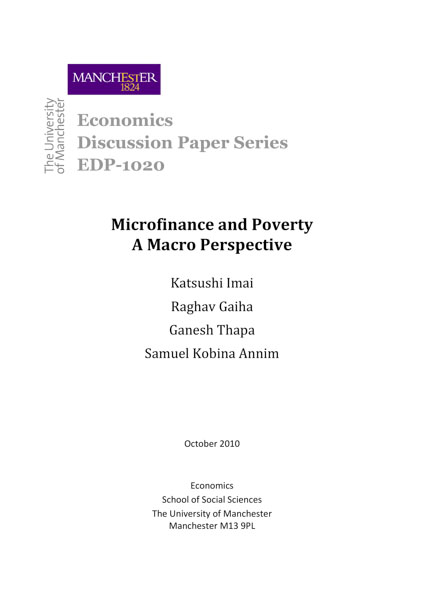Microfinance initiatives have garnered significant attention in the global discourse on poverty alleviation. As proponents of social justice and equity, the Bahá’í teachings offer a profound perspective on the role of microfinance in the broader struggle against poverty. Might it be possible that a focused approach on microfinance, imbued with the principles of Bahá’í teachings, could fundamentally reshape the dynamics of poverty? This inquiry is not merely academic; it raises substantial challenges in aligning economic practices with spiritual ideals.
The Bahá’í faith, rooted in the principle of the oneness of humanity, posits that the elimination of poverty is not merely a financial challenge but a multifaceted dilemma that intertwines social, moral, and spiritual dimensions. For the Bahá’í community, the eradication of poverty involves cultivating a sense of dignity and self-worth in all individuals, while simultaneously fostering an economic environment that empowers marginalized populations.
Microfinance, which provides small loans and financial services to individuals lacking access to traditional banking systems, embodies a strategic intersection of economic action and social empowerment. However, the Bahá’í view extends beyond the mere act of lending; it emphasizes the importance of ethical considerations in financial practices. In the discourse surrounding microfinance, one must ponder: How can the principles of justice, equity, and compassion, integral to Bahá’í teachings, be woven into the fabric of microfinance to enhance its efficacy?
One of the distinguishing features of Bahá’í teachings is the emphasis on the inherent nobility of every human being. This doctrine articulates that poverty is not merely a condition of material deprivation; rather, it is a state that can diminish the potential of individuals to contribute to society. Thus, microfinance, when approached from a Bahá’í perspective, must embrace more than just monetary transactions. It should be a catalyst for personal and community transformation, promoting holistic development.
The integration of spiritual education within microfinance initiatives serves to empower recipients, equipping them with the necessary tools to manage finances responsibly. This approach aligns with the Bahá’í tenet that all economic activity must advance the well-being of the community. In practical terms, this means that microfinance institutions ought to provide not only monetary assistance but also training and resources that enhance financial literacy, entrepreneurship, and personal development.
However, challenges abound. The traditional models of microfinance can inadvertently perpetuate cycles of debt, undermining the very ideals of empowerment and dignity. Critics often highlight the predatory practices that have emerged within some microfinance frameworks, raising ethical concerns that resonate deeply with Bahá’í values. This scenario invites contemplation: Can microfinance practices evolve in a manner that is both economically viable and ethically sound, as envisioned by Bahá’í teachings?
To address this challenge, it becomes imperative to adopt a paradigm shift towards a more ethical model of microfinance. Such a model would prioritize the welfare of borrowers over the profitability of lenders. By embracing transparency, equitable interest rates, and compassionate repayment schemes, microfinance institutions can better align their operations with Bahá’í principles, enhancing their legitimacy and effectiveness in poverty alleviation.
A key aspect of this ethical shift involves fostering collaborative networks among stakeholders, including microfinance institutions, local communities, and Bahá’í organizations. Through collaboration, resources can be pooled, expertise can be shared, and comprehensive support systems can be established. Such partnerships not only bolster the efficacy of microfinance initiatives but also engender a spirit of collective responsibility and mutual support—hallmarks of Bahá’í teachings.
The concept of consultation, a cornerstone of Bahá’í practice, can also be instrumental in improving microfinance strategies. Engaging beneficiaries in the decision-making processes about funding and resource allocation fosters a sense of ownership and accountability. This participatory approach aligns with the Bahá’í belief in the collaborative nature of human development and recognizes the invaluable insights that local communities can offer.
Moreover, the spiritual aspect of microfinance cannot be overlooked. By invoking a sense of purpose and ethical stewardship among both lenders and borrowers, microfinance initiatives can transcend mere transactional relationships. The infusion of spiritual principles into financial dealings encourages a culture of respect and trust, reinforcing the belief that economic activity should contribute to the collective advancement of humanity.
As we explore the intersection of microfinance and Bahá’í teachings, it becomes evident that the challenge to implement these ideals in practice is formidable. Yet, it is precisely within this challenge that opportunities for innovation and meaningful change arise. By engaging with the complexities of poverty through a Bahá’í lens, microfinance can evolve into a powerful tool for transformation, fostering conditions in which all can thrive.
In conclusion, while microfinance holds potential as a means of poverty alleviation, it is imperative to ensure that its implementation reflects the humane and ethical standards advocated by the Bahá’í teachings. By prioritizing dignity, justice, and spiritual education, a more robust framework for microfinance can be developed—one that not only addresses financial needs but also enhances the quality of life for individuals and communities alike. This vision is not merely aspirational; it is a call to action for all stakeholders involved in the quest to eliminate poverty through the transformative power of human kindness and collaboration.
